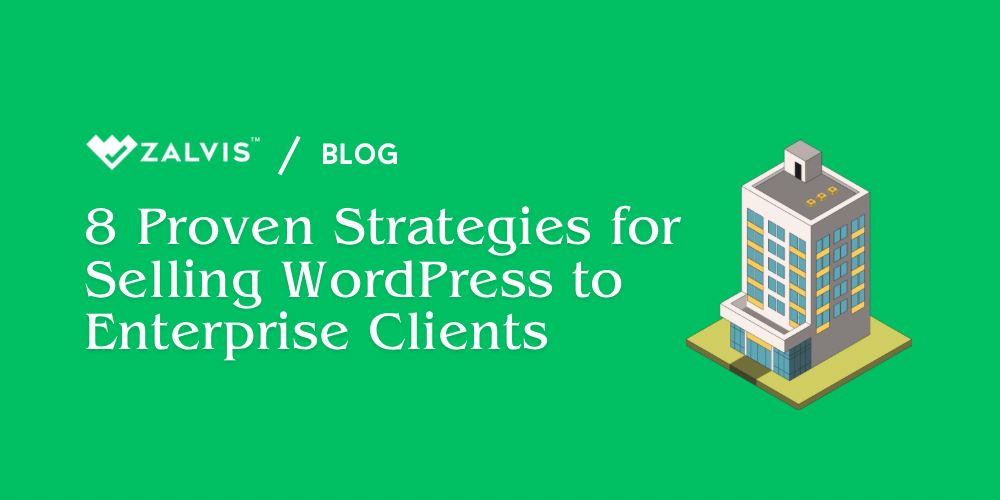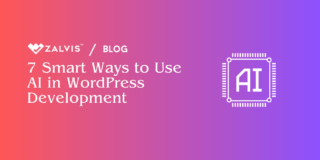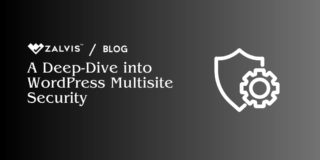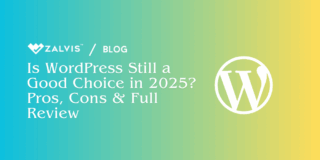In the rapidly evolving digital landscape, enterprise businesses are continually seeking scalable, reliable, and cost-effective solutions for their web platforms. As these companies grow, their website infrastructure must grow with them, adapting to increasing demands, traffic, and business needs. One platform that consistently delivers on these needs is WordPress. Originally designed for bloggers and small businesses, WordPress has evolved into a powerful content management system (CMS) capable of supporting enterprise-level websites.
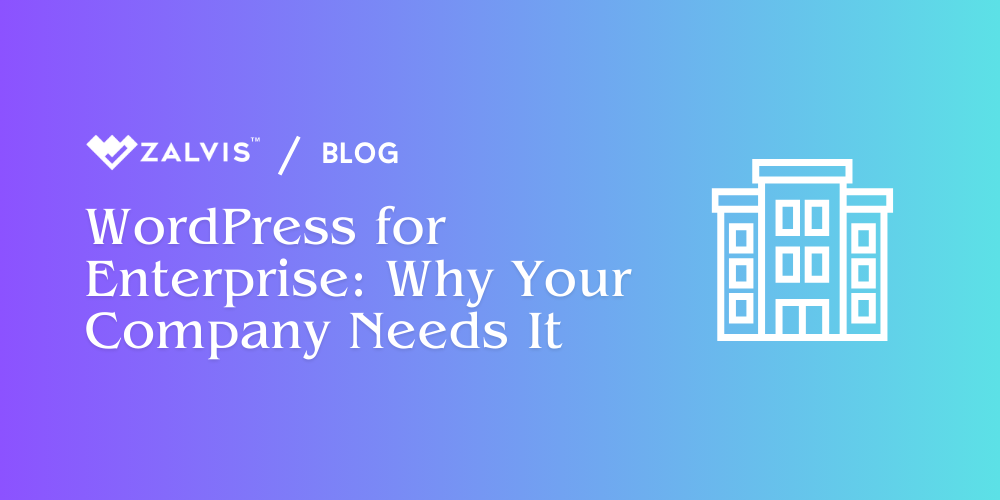
In this article, we will explore why WordPress has become the go-to platform for enterprise businesses, looking at its scalability, flexibility, cost-efficiency, security, and more. Whether your company operates in e-commerce, finance, technology, or media, WordPress offers the tools necessary to maintain a competitive edge in today’s digital marketplace.
What does WordPress for Enterprise mean?
WordPress for Enterprise is the application of the WordPress platform to meet the needs of large businesses. These organizations are usually multinational corporations with multiple domains and thousands of users accessing their sites at once.
According to WordPress, their enterprise solutions are used “wherever there’s a requirement for flexible, cost-effective, and secure creation and distribution of content.” Media and publishing organizations, E-commerce sites, and other large-scale businesses use this solution for their online marketing, communication, and commerce needs.
The Evolution of WordPress: From Blogging to Enterprise Solution
WordPress began as a simple blogging tool when it launched in 2003. Over the past two decades, it has matured into the most popular CMS on the web, powering over 40% of all websites globally, including some of the world’s largest enterprises like The Walt Disney Company, BBC America, and Sony Music. This shift from a simple blogging tool to a full-fledged CMS happened due to its open-source nature, which allowed for continuous improvement through a global community of developers. Today, WordPress can handle the complexities of enterprise-level operations thanks to its robust plugin ecosystem, customizable themes, and versatile API integrations.
Open-Source Advantages for Enterprises
The open-source nature of WordPress gives it a massive advantage for enterprises. Open-source software means that the core platform is freely available to everyone, and the code can be customized and extended without restrictions. For enterprises, this eliminates the need to rely on proprietary systems that lock them into a single vendor or technology stack. Furthermore, enterprises can tap into a global talent pool of developers who are proficient in WordPress, allowing for rapid innovation and lower costs.
The collaborative nature of open-source development also ensures that WordPress stays at the forefront of technological advancements. Enterprises can be assured that the platform will evolve with new web standards, security updates, and industry demands, without the need for expensive custom solutions.
Scalability: Building for Growth
One of the most crucial considerations for enterprise businesses is scalability. Enterprise websites typically handle millions of visitors each month, along with complex workflows, e-commerce transactions, user data management, and more. WordPress, when set up properly, is fully capable of scaling to meet the needs of even the largest enterprises.
Handling High Traffic Loads
WordPress can handle high traffic volumes by using optimized hosting environments, such as managed WordPress hosting or VPS (Virtual Private Server) hosting, which offer dedicated resources to ensure website performance. In addition, caching plugins, CDNs (Content Delivery Networks), and server-side optimizations make it possible to serve millions of page views without performance degradation.
With managed WordPress hosting solutions like Zalvis, WP Engine, Kinsta, or your enterprise’s own infrastructure, traffic spikes can be accommodated without downtime. Features such as autoscaling can also ensure that your website continues to perform optimally, even during high-demand events like product launches or media surges.
Multisite Functionality
For enterprises managing multiple websites or localized versions of a brand, WordPress offers a multisite functionality that allows for the administration of multiple sites from a single dashboard. This is especially useful for large companies operating in different regions, offering tailored content for various markets. Each site can maintain its unique domain, design, and functionality while still being connected to the core framework of the parent company’s web infrastructure.
Flexibility: Tailored to Your Needs
Another reason why WordPress is ideal for enterprises is its immense flexibility. Unlike many CMS platforms that come with predefined structures and limitations, WordPress offers virtually unlimited possibilities for customization.
Themes and Plugins: Infinite Customization
The extensive library of themes and plugins enables enterprises to tailor their websites to their exact requirements. While smaller businesses may rely on pre-built themes and plugins, enterprises often invest in custom themes and development. WordPress’ ability to support custom themes means your company can create a unique digital experience that aligns perfectly with your brand identity, messaging, and goals.
Plugins further enhance this customization by extending the core functionality of WordPress. Whether you need advanced SEO tools, enhanced security, e-commerce capabilities, or custom analytics, there’s likely a plugin that meets your needs. For example, WooCommerce, the most popular e-commerce plugin for WordPress, powers millions of online stores and can be customized to support enterprise-grade e-commerce features like product filtering, dynamic pricing, and complex checkout processes.
Custom plugin development is also a common practice for enterprises, allowing them to build highly specialized functionalities specific to their business needs. The open architecture of WordPress ensures that any feature can be added through a custom plugin without disrupting the core platform’s performance.
Seamless Integration with Enterprise Tools
Most enterprise businesses rely on an array of digital tools to manage operations, sales, marketing, and customer relations. WordPress excels in integrating with these tools, making it a seamless component of your broader technology ecosystem. Whether you need to integrate with CRM systems like Salesforce, marketing automation tools like HubSpot, or data analytics platforms like Google Analytics, WordPress can easily communicate with these services through APIs and third-party integrations.
Enterprise resource planning (ERP) systems, human resource management (HRM) platforms, and financial software can also be integrated into WordPress to provide a cohesive user experience across all departments. This flexibility enables enterprises to build a fully customized, end-to-end digital solution that supports both internal processes and customer-facing interactions.
Security: Enterprise-Grade Protection
Security is a paramount concern for enterprise businesses, especially those operating in highly regulated industries like finance, healthcare, or government. WordPress, when configured correctly, can provide the robust security features required for enterprise websites.
Continuous Security Enhancements
As an open-source platform, WordPress benefits from continuous security enhancements from both the core development team and the broader WordPress community. Security updates are regularly pushed to address vulnerabilities, and many plugins offer additional layers of protection, such as firewalls, two-factor authentication (2FA), and malware scanning.
Enterprise businesses can also implement advanced security measures such as SSL certificates, encryption protocols, and DDoS protection to safeguard their websites. Managed WordPress hosting providers often include built-in security measures, offering 24/7 monitoring, automatic backups, and proactive threat detection.
Compliance and Data Privacy
For enterprises that must comply with data privacy regulations such as GDPR, HIPAA, or CCPA, WordPress can be configured to meet these requirements. Through plugins and custom development, businesses can create compliance-friendly websites that handle user data securely and in accordance with the law. This includes tools for managing user consent, encrypting personal data, and providing users with control over their information.
WordPress can also generate audit logs, track user activity, and maintain detailed records of data processing activities—features that are crucial for enterprises subject to stringent regulatory oversight.
Cost-Effectiveness: Lower Total Cost of Ownership
Enterprise businesses must balance performance and security with cost-efficiency. One of the significant advantages of WordPress is its cost-effectiveness, particularly when compared to proprietary enterprise-level CMS platforms like Adobe Experience Manager or Sitecore.
Lower Development Costs
WordPress’ open-source nature and wide adoption mean there’s a vast talent pool of developers familiar with the platform, leading to lower development costs. Enterprises are not restricted to working with a limited number of certified developers, as they often are with proprietary systems. This leads to competitive pricing for development work and faster project timelines.
Minimal Licensing Fees
Unlike proprietary platforms, which often come with hefty licensing fees, WordPress itself is free to use. Enterprises can allocate their budget to other critical areas like custom development, performance optimization, and marketing rather than paying ongoing fees for CMS licenses.
Long-Term Savings
The long-term savings associated with WordPress extend beyond just the cost of the platform itself. Enterprises can reduce dependency on external vendors, leverage in-house development teams, and avoid expensive upgrades that are common with proprietary platforms. The community-driven nature of WordPress ensures it is always evolving, meaning your enterprise site can stay cutting-edge without significant reinvestment.
Performance: Delivering a Seamless User Experience
For enterprise businesses, website performance is crucial. A fast, reliable website directly influences user engagement, conversion rates, and SEO rankings. WordPress is highly optimized for performance when paired with the right hosting environment and configurations.
Optimized Hosting and Speed Enhancements
Managed WordPress hosting providers offer optimized environments that ensure high performance and fast load times. Techniques such as server-side caching, content distribution networks (CDNs), and database optimization are essential for enterprises serving a global audience. Moreover, WordPress performance can be further enhanced by using lightweight themes, minimizing external scripts, and compressing media files.
Mobile Optimization
Mobile responsiveness is critical for enterprise websites, especially as more users access content via smartphones and tablets. WordPress is designed to be mobile-friendly, with many themes offering built-in responsive design elements. Furthermore, developers can leverage the REST API to create mobile apps that integrate seamlessly with the WordPress CMS, providing a consistent experience across devices.
Community and Support: A Global Ecosystem of Resources
One of the biggest strengths of WordPress is its vast community of developers, designers, and users who continuously contribute to its development. This global network ensures that WordPress remains up-to-date with the latest web standards, security protocols, and technological advancements. For enterprises, this means access to an extensive knowledge base, including documentation, tutorials, forums, and professional services.
In addition, many enterprise-focused companies specialize in WordPress support, offering tailored services such as security audits, performance optimization, and ongoing maintenance. Enterprises can also choose from a wide range of agencies and freelancers with deep expertise in WordPress to manage their websites.
Case Studies: Enterprises Using WordPress
Many global enterprises have turned to WordPress for their web infrastructure. Below are a few examples that highlight the platform’s capability to handle the complexities of large-scale operations:
- The Walt Disney Company: Disney uses WordPress for various digital properties, including content-heavy websites that require seamless content management and high-performance capabilities. WordPress’ flexibility allows Disney to create immersive digital experiences that engage their audience across multiple platforms.
- Sony Music: Sony Music uses WordPress to manage artist websites and integrate multimedia content, including streaming and video platforms. The customizability of WordPress has enabled Sony Music to create visually engaging and interactive experiences for its global audience.
- BBC America: BBC America relies on WordPress for its online presence, leveraging the platform’s scalability to deliver content to millions of visitors. The site handles large volumes of traffic, thanks to a combination of caching, CDNs, and optimized hosting.
Conclusion: Why WordPress is the Right Choice for Your Enterprise
WordPress has evolved into a robust enterprise-level CMS that offers unparalleled flexibility, scalability, and cost-efficiency. Its ability to handle large volumes of content, traffic, and transactions makes it ideal for businesses looking to expand their digital footprint. By adopting WordPress, enterprises can enjoy the benefits of an open-source platform backed by a global community, along with the ability to create custom, secure, and high-performance websites.
In an era where digital experiences define brand success, enterprises need a platform that can keep up with the ever-changing demands of the market. WordPress provides the tools, security, and scalability necessary to maintain a competitive edge, making it a smart choice for any enterprise looking to build a sustainable and powerful online presence.
If you enjoyed this article, then you’ll love Zalvis's WordPress Hosting platform. Turbocharge your website and get 24/7 support from our veteran team. Our world-class hosting infrastructure focuses on auto-scaling, performance, and security. Let us show you the Zalvis difference! Check out our plans.
